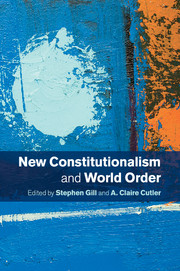Book contents
- Frontmatter
- Contents
- List of Figures
- List of Contributors
- Acknowledgements
- List of Acronyms
- 1 New constitutionalism and world order
- Part I Concepts
- 2 Market civilization, new constitutionalism and world order
- 3 New constitutionalism and the commodity form of global capitalism
- 4 The rule of law as the Grundnorm of the new constitutionalism
- Part II Genealogy, origins and world order
- Part III Multilevel governance and neo-liberalization
- Part IV Trade, investment and taxation
- Part V Social reproduction, welfare and ecology
- Part VI Globalization from below and prospects for a just new constitutionalism
- Glossary
- Appendix
- Bibliography
- Index
4 - The rule of law as the Grundnorm of the new constitutionalism
from Part I - Concepts
Published online by Cambridge University Press: 05 February 2014
- Frontmatter
- Contents
- List of Figures
- List of Contributors
- Acknowledgements
- List of Acronyms
- 1 New constitutionalism and world order
- Part I Concepts
- 2 Market civilization, new constitutionalism and world order
- 3 New constitutionalism and the commodity form of global capitalism
- 4 The rule of law as the Grundnorm of the new constitutionalism
- Part II Genealogy, origins and world order
- Part III Multilevel governance and neo-liberalization
- Part IV Trade, investment and taxation
- Part V Social reproduction, welfare and ecology
- Part VI Globalization from below and prospects for a just new constitutionalism
- Glossary
- Appendix
- Bibliography
- Index
Summary
In contemporary global politics there can be few more popular normative appeals than to the rule of law. Norms such as democracy and human rights are frequently expressed by global leaders and political activists, and alongside them, the rule of law has become almost universal in its invocation, despite much less agreement about its effective implementation. If the ‘new constitutionalism’ represents one part of the neo-liberalization of the global political economy, then this is founded on the establishment of the rule of law as (potentially) universal common sense. In his recent meta-history of Western civilization, for example, Niall Ferguson made the rule of law (linked with property rights) one of the six ‘killer apps’ of Western domination of the global system (2011: Chapter 3). Indeed, it is easy to find appeals to the value and necessity of the rule of law by a range of commentators, politicians and national or global technocrats in any given week.
Conversely, for a minority of critics, the rule of law is far from benign: Ugo Mattei and Laura Nader (2008) argue that the (pretended) universality of the rule of law, by excluding much that is local/regional and that which has been established under different legal norms, is undermined by the actual imposition of a Westernized rule of law that seeks to structure societies to enhance and facilitate plunder of the local resources. This imposition undermines the ‘real’ (localized and organic) rule enjoyed by various communities: the rule of law, although itself contaminated by imperialism at the global level, still has value for local societies, in the guise of the ‘people’s rule of law’ (ibid.: 202–11). As this implies, on both the right and the left, the rule of law has become an important touchstone for contemporary global politics.
- Type
- Chapter
- Information
- New Constitutionalism and World Order , pp. 63 - 76Publisher: Cambridge University PressPrint publication year: 2014
- 3
- Cited by



